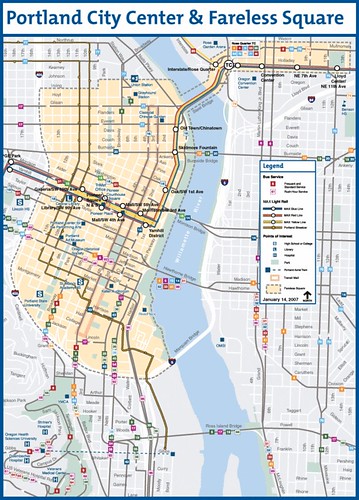Free transit/fareless square issues in Seattle and Portland
Portland is going to change their policy about free bus trips within their fareless square, stating that only about 1/3 of the trips originate and end within the designated area, and that many people get away without paying for trips outside the zone. See "Fareless Square: TriMet board cuts buses out of Fareless Square" and the editorial, "Keep Fareless Square open, friendly, simple -- and safe," from the Portland Oregonian.
This letter to the editor, "Livability concerns as Fareless ends for buses" raises questions of equity (similar to points I have made in the past), that transit policy preferencing rail benefits higher income people often at the expense of those of more limited means.
And this blog entry, "Fareless Square - TriMet's fixation" is pretty derisive of the policy change based on the constrained set of options that were considered. While confusing, they could have moved to the Seattle method of payment for trips originating in the fareless square area, you pay when you get off the bus, not when you get on. (The TriMet report can be found here.)

In Seattle, the City of Seattle pays King County Metro $400,000/year for the provision of free service in their fareless area, but the transit authority estimates that the real cost is at least 15 times higher, serving about 10 million people/year. See "Plan: Charge Seattle millions more for free downtown buses" and "Downtown merchants: Ride Free Area benefits all county commuters" from the Seattle Post-Intelligencer. and "King County lawmakers propose Metro bus increase" from the Seattle Times.
Of course, the City of Seattle doesn't want to pay more for this service, which at this juncture, could only be paid by cutting other city services.
But this does give some perspective on calculating the cost of providing free surface transit service in DC, which I estimated once would cost about $70 million/year.
Also see this past blog entry, "An idea for free public transit within DC" and "Free ride? Fat chance: Muni fares will stay" and "Other cities have found free-fare transit a bumpy road" from the San Francisco Chronicle and the series "No Fares! from The Tyee of Vancouver, BC.
Labels: transit economics, transit fares, transit funding, transportation planning



0 Comments:
Post a Comment
<< Home